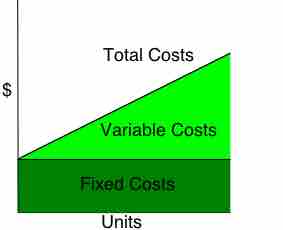Fixed Costs
Determining the cost of producing a product or service plays a vital role in most pricing decisions. Fixed costs are business expenses that are not dependent on the level of goods or services produced by the business. They tend to be time-related, such as salaries or rents being paid per month. They and are often referred to as overhead costs. This is in contrast to variable costs, which are volume-related and are paid per quantity produced. In management accounting, fixed costs are defined as expenses that do not change as a function of the activity of a business, within the relevant period. For example, a retailer must pay rent and utility bills irrespective of sales. In marketing, it is necessary to know how costs divide between variable and fixed. This distinction is crucial in forecasting the earnings generated by various changes in unit sales and thus the financial impact of proposed marketing campaigns. In a survey of nearly 200 senior marketing managers, 60% responded that they found the "variable and fixed costs" metric very useful .

Fixed Costs and Variable Costs
This graph breaks down the difference between fixed costs and variable costs.
Fixed costs are not permanently fixed - they will change over time - but are fixed in relation to the quantity of production for the relevant period. For example, a company may have unexpected and unpredictable expenses unrelated to production. Warehouse costs and the like are fixed only over the time period of the lease. By definition, there are no fixed costs in the long run. Investments in facilities, equipment, and the basic organization that can't be significantly reduced in a short period of time are referred to as committed fixed costs. Discretionary fixed costs usually arise from annual decisions by management to spend on certain fixed cost items. Examples of discretionary costs are advertising, machine maintenance, and research and development expenditures.
Average Fixed Costs
For pricing purposes, marketers generally take into account average fixed costs. Average fixed cost (AFC) is an economics term that refers to fixed costs of production (FC) divided by the quantity (Q) of output produced . Average fixed cost is a per-unit-of-output measure of fixed costs. As the total number of goods produced increases, the average fixed cost decreases because the same amount of fixed costs is being spread over a larger number of units of output.